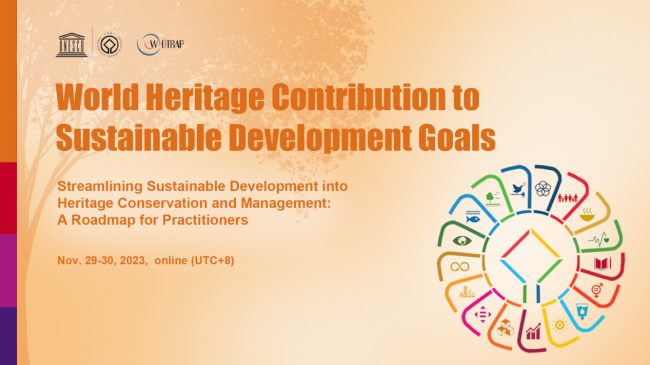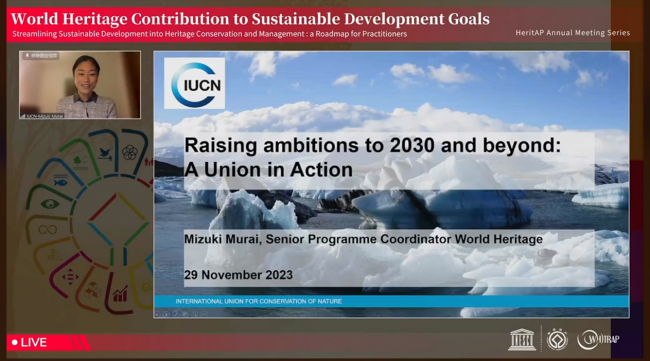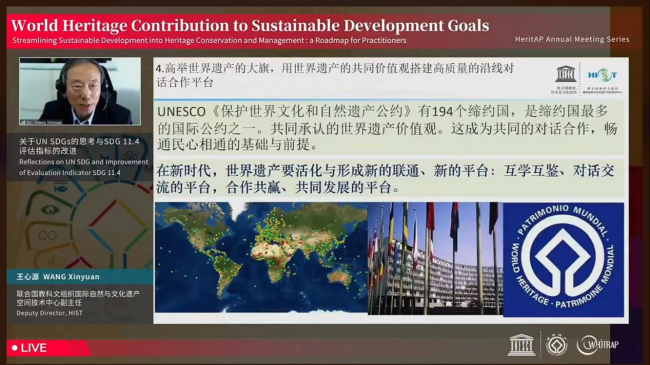| Summary | 2023 HeritAP Annual Meeting on World Heritage Contribution to Sustainable Development Goals |
| PublishDate:2023-12-12 Hits:16607 |
Event Cover
2023 HeritAP Annual Meeting on World Heritage Contribution to Sustainable Development Goals
Streamlining Sustainable Development into Heritage Conservation and Management:
A Roadmap for Practitioners
Executive Summary
On 29-30 November, the 2023 HeritAP Annual Meeting on “World Heritage Contribution to Sustainable Development Goals” was held online. The annual meeting was organized by the World Heritage Institute of Training and Research for the Asia and the Pacific Region under the auspices of UNESCO (WHITRAP Shanghai), College of Architecture and Urban Planning, Tongji University, Shanghai Tongji Urban Planning and Design Institute Co. Ltd.
The 2023 HeritAP annual meeting aimed at facilitating the understanding of the 2015 Policy on the Integration of a Sustainable Development Perspective into the Processes of the World Heritage Convention (the 2015 Policy) and proposed to streamline a roadmap for heritage practitioners through six-year HeritAP project. Mr. Lazare ELOUNDOU (Director of World Heritage Centre) and Prof. ZHOU Jian (Secretary-General of WHITRAP) delivered the opening addresses. Ten experts were invited to present at the annual meeting. In total of 53 person-times attended the Zoom meeting and about 3863 person-times watched the live stream over the course of the two-day meeting.
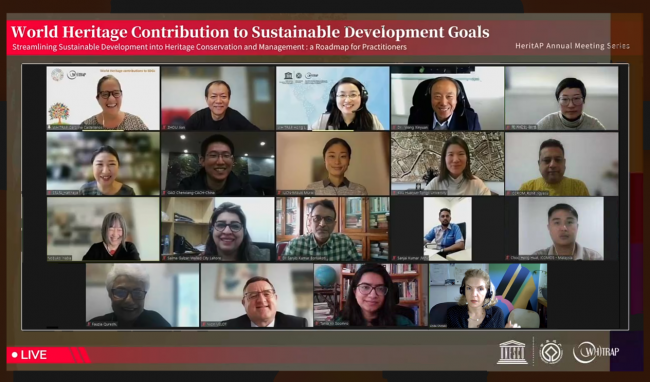 Online Group Photo
On 29th November, representatives interpreted the Policies and their implementation from global level to national level.
Ms. Mizuki MURAI (Senior Programme Coordinator World Heritage, IUCN) gave an overview of how IUCN has engaged with World Heritage and presented the ongoing initiatives and recommendations for future work, including the 8 key strategic and operational recommendations for IUCN’s engagement with the World Heritage Convention.
Ms. Mizuki MURAI presenting
Prof. WANG Xinyuan (Deputy Director, HIST) discussed the challenges of monitoring the Sustainable Development Goals. He analyzed the challenges facing Goal 11.4, particularly target number 4 centered on cultural and natural heritage, related to indicators and the need to use diversified sources of information. He also investigated the lack of methodological approaches to make the best use of big data for such a target and the correlation that needs to exist between investments and benefits. Finally, Prof. WANG made five recommendations on the use of technologies and the need to disseminate efforts and further develop proposals.
Prof. WANG Xinyuan presenting
Ms. Hattaya SIRIPHATTHNAKUM (Senior Specialist in Cultural Heritage Management, SPAFA) introduced the role of SPAFA in promoting the achievement of sustainable development goals utilizing heritage as a driver of initiatives. She underscored the importance of capacity development and raised questions on the sustainability of the efforts themselves, as well as the results, and pointed out some aspects that could enhance sustaining results in the long term. She also provided examples of work implemented by SPAFA regarding policy planning and implementation for integrating SDGs in cultural activities.
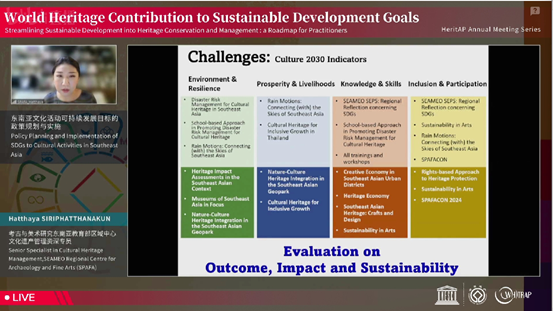 Ms. Hattaya SIRIPHATTHNAKUM presenting
Mr. GAO Chenxiang (Project Coordinator, China Academy of Cultural Heritage) presented the national practices in China to mainstream the discussion of sustainable development in World Heritage Conservation and analyzed how World Heritage can be useful to connect not only the SDGs but also the multiple targets and the use of different data sources and indicators. He provided an overview of the 2030 Progress Report and how the retrospective review has allowed to define new policies with a holistic view to be integrated to improve the lives of people by harnessing the potential of heritage.
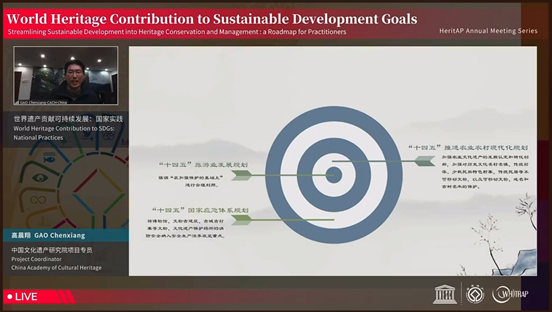 Mr. GAO Chenxiang presenting
On 30th November, experts provided examples of how to illustrate the good practices at site level focusing on Dimension One: Environment and Resilience.
Ms. Carolina CASTELLANOS (Senior Consultant, WHITRAP Shanghai) provided a summary of the state of the art regarding policies and frameworks that have been developed to mainstream sustainable development into heritage conservation and management to evaluate what is still needed to better assist practitioners. She presented an outline of the proposed process to streamline sustainability policy into heritage practice and the potential end-products to be developed through HeritAP’s six-year initiative, mainly guidance for practitioners and a roadmap for the World Heritage sector.
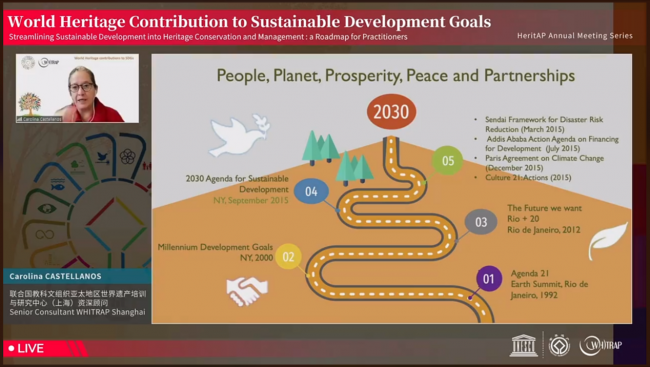 Ms. Carolina CASTELLANOS presenting
Mr. Rohit JIGYASU (Project Manager for Urban Heritage, Climate Change and Disaster Risk Management, ICCROM) showed how the unprecedented climate-induced disasters, slow progressive factors, rapid urbanization and unplanned sprawls have exacerbated vulnerability conditions and impacts on heritage. He underscored that there is still work to be done in integrating institutions and sectors dealing with different factors and how crucial it is to integrate efforts, particularly if considering a much-needed territorial approach. He also mentioned how ICCROM has adapted its programs to better meet these challenges and showed the example of Nantucket in implementing the proposed approaches.
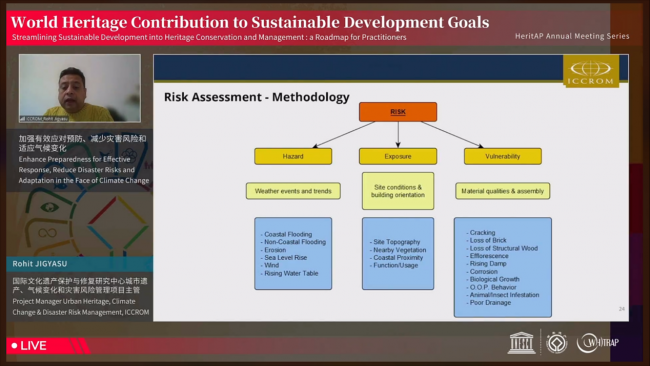 Mr. Rohit JIGYASU presenting
Prof. ZHANG Kai (Director, Planning and Design Studio Four, Shanghai Tongji Urban Planning & Design Institute Co. Ltd.) spoke about the sustainable management of urban heritage, with the example of Shache, which demonstrates layers of tangible and intangible values embodied in surviving fabric in a dynamic environment. Her presentation gave examples for alternatives for renewal, not only of public buildings but also private dwellings and the protection of other features, not only heritage buildings but also public spaces. Finally, she highlighted the importance of the project for creating jobs and sources of income post the covid pandemic.
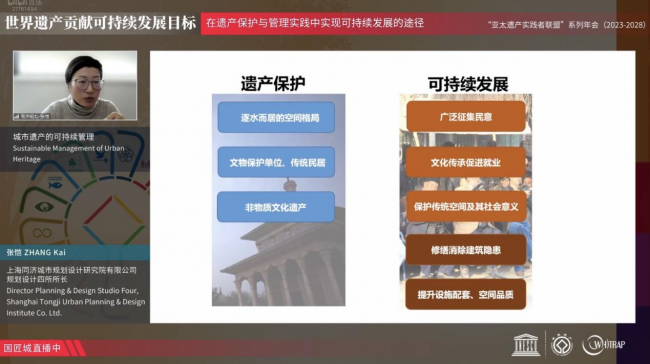 Prof. ZHANG Kai presenting
Prof. Nobuko INABA (Emerit Professor, University of Tsukuba) discussed the conservation and management of cultural and natural resources in Japan, emphasizing how nature and culture are not divided in practice but only in the frameworks for addressing challenges. She presented cases studies in Japan to illustrate the actors and variety of stakeholders involved in projects, the systems for protection and how these have evolved overtime. She also showed different processes for decision-making, where key actors and leaders vary according to the typologies of heritage, raising the importance of tailoring methodologies and approaches when dealing with a variety of contexts and types of cultural and natural heritage.
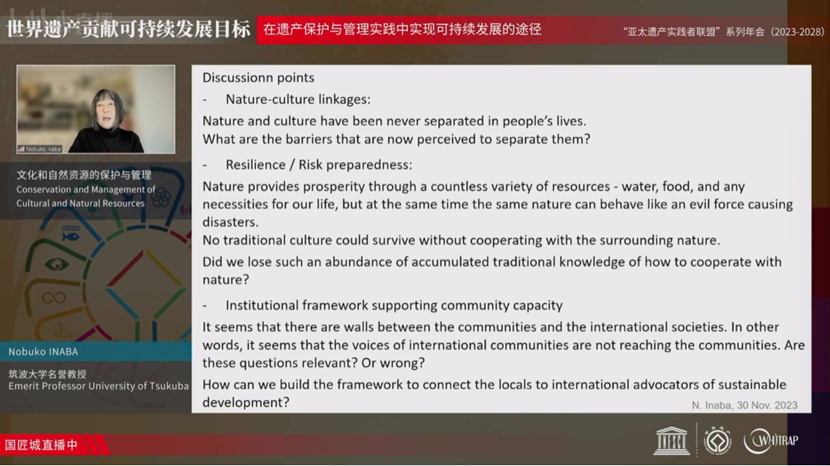 Prof. Nobuko INABA presenting
Prof. KOU Huaiyun (Associate Professor, Tongji University) gave a presentation on the interaction between public space and community in heritage sites, showcasing two sites, Dong Villages and Xijie. She emphasized the influence of cultural practices, traditions, and values on shaping surroundings, including the natural environment. Through the Dong Villages cases, heritage place-making processes, and their continuity, were clearly demonstrated, highlighting the importance of creating mechanisms for the protection of the settings that allow for these practices to occur. Meanwhile, the reconstruction of Xijie demonstrated how meeting community needs for open spaces post-earthquake enhanced cultural practices, revitalized social integration, and provided opportunities for renewed usage.
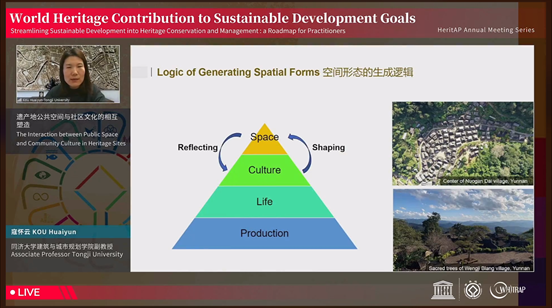 Prof. KOU Huaiyun presenting
Finally, Ms. LI Hong (Programme Specialist, WHITRAP Shanghai) further introduced the six-year project (2023-2028) of HeritAP that includes research, professional exchange meetings and field studies. She called for good practices and host sites in the integration of sustainable development in heritage conservation and management.
HeritAP anticipates more exemplary cases and advanced experiences in World Heritage contribution to SDGs to be shared on a boarder scale. It aims to assist practitioners, institutions, communities, and networks involved in World Heritage to harness the benefits that engagement in sustainable development can deliver to properties.
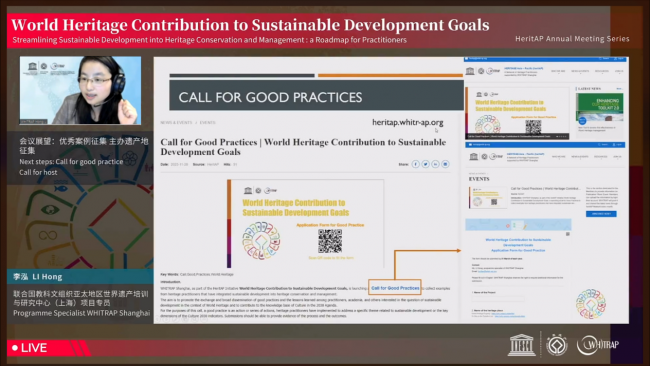 Ms. LI Hong presenting: call for good practices
Contributed by: Dong Zhaoqi (Intern)
Edited by: Jiang Yunyang (Intern)
|
- Side Event of WHE Towards the Future & Announcement of 2025 AWHEIC
- News | WHITR-AP Shanghai and ICCROM Renews MoU
- News丨47th Session of the World Heritage Committee Kicks Off
- Preview | 47th Session of the World Heritage Committee in Paris
- New | 2nd WH+ST Chinese Pilot Project Concluded in Yancheng
- News | 4 th Technical Meeting of UHC-HEI International Network
Copyright © 2009-2012 World Heritage Institute of Training and Research-Asia and Pacific (shanghai)


